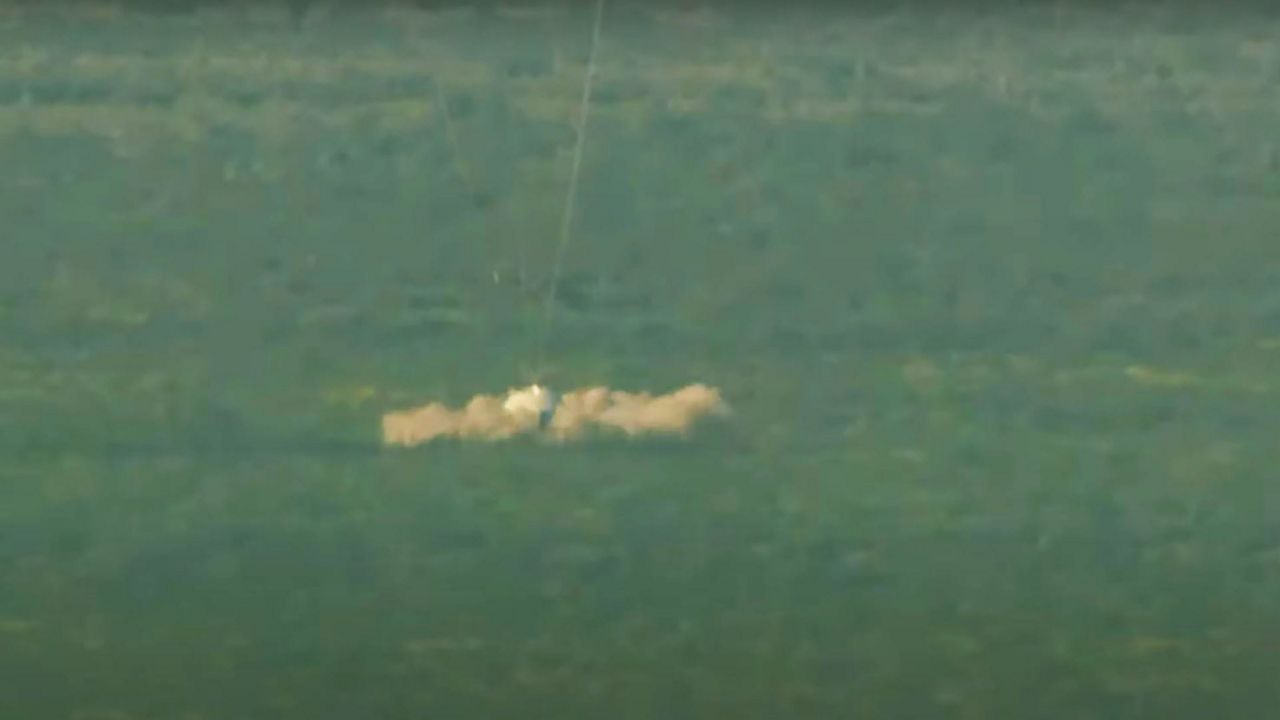Is A New Cold War Inevitable? Analyzing The Deterioration Of U.S.-China Relations

Table of Contents
Economic Competition: A Key Driver of US-China Tensions
Economic competition forms a bedrock of the escalating US-China conflict, significantly contributing to the anxieties surrounding a potential new Cold War. Several key aspects exacerbate this tension:
Trade Wars and Tariffs:
The history of trade disputes between the US and China is long and complex, marked by accusations of unfair trade practices and intellectual property theft from China's side. The 2018 trade war, initiated by the US, saw the imposition of significant tariffs on billions of dollars worth of Chinese goods, triggering retaliatory measures from Beijing. This tit-for-tat escalation disrupted global supply chains, impacted consumer prices, and damaged investor confidence. Allegations of widespread intellectual property theft by Chinese companies further fueled the conflict, adding another layer of complexity to the economic rivalry.
- Key Events: Imposition of tariffs on steel and aluminum, retaliatory tariffs on US goods, ongoing negotiations and partial trade deals.
- Impact: Reduced global trade, increased prices for consumers, uncertainty in investment markets.
Technological Rivalry: The 5G Race and Beyond
The race to dominate 5G technology and other advanced technologies represents a crucial front in the US-China economic and geopolitical conflict. The US views China's technological advancements, particularly those made by companies like Huawei, as a threat to its national security and global technological dominance. This has led to restrictions on Huawei's access to US technology and components, reflecting a broader trend of technological decoupling between the two nations. The implications extend far beyond 5G, encompassing artificial intelligence, semiconductors, and other critical technologies.
- Key Players: Huawei, Qualcomm, Intel, and various US government agencies.
- Impact: Global competition for technological leadership, potential fragmentation of the technology sector, national security concerns.
Investment Restrictions and Economic Sanctions:
Both the US and China have increasingly imposed restrictions on investments from the other country. The US has utilized sanctions as a tool to exert political pressure on China, targeting specific companies and individuals involved in activities deemed detrimental to US interests. These actions contribute to a climate of distrust and uncertainty, impacting global economic stability and potentially escalating tensions towards a new Cold War scenario.
- Examples: Restrictions on Chinese investment in US technology companies, sanctions on Chinese officials over human rights concerns.
- Impact: Reduced cross-border investment, increased economic uncertainty, potential for further escalation.
Geopolitical Rivalry and Military Buildup:
Beyond economic competition, geopolitical rivalry and a significant military buildup further intensify concerns about a new Cold War between the US and China.
South China Sea Disputes:
China's increasingly assertive actions in the South China Sea, including the construction of artificial islands and the assertion of expansive maritime claims, have led to heightened tensions with the US and its allies. These actions challenge the principle of freedom of navigation, a cornerstone of the international order, and have fueled a military buildup in the region.
- Key Issues: Island building, maritime claims, freedom of navigation.
- Impact: Regional instability, increased military presence, potential for conflict.
Taiwan Strait Tensions:
The status of Taiwan remains one of the most sensitive issues in US-China relations, with the potential for conflict posing a significant threat. China considers Taiwan a breakaway province and has not ruled out the use of force to achieve reunification. The US, on the other hand, provides Taiwan with defensive arms and has stated its commitment to Taiwan's defense. This ambiguous stance fuels tensions and contributes to a volatile military buildup on both sides of the strait.
- Key Issues: China's claim over Taiwan, US arms sales to Taiwan, potential for military conflict.
- Impact: Regional instability, risk of major armed conflict, global economic consequences.
Global Influence and Alliances:
The US and China are engaged in a fierce competition for global influence, vying for partnerships and alliances around the world. This competition manifests itself in various ways, from diplomatic initiatives to support for competing multilateral organizations. This struggle for global dominance is another factor that contributes to the potential for a new Cold War.
- Key Aspects: Competition for influence in Africa, Latin America, and other regions; support for different international organizations.
- Impact: Increased geopolitical fragmentation, potential for proxy conflicts, global instability.
Ideological Differences and Human Rights Concerns:
Fundamental ideological differences and ongoing human rights concerns further complicate the US-China relationship, contributing to the perception of a potential new Cold War.
Divergent Political Systems:
The fundamental differences between the US democratic system and China's authoritarian model create a deep chasm of mistrust. These differing political systems underpin many of the conflicts, making compromise and cooperation challenging.
- Impact: Limited scope for mutual understanding and compromise, fueling suspicion and antagonism.
Human Rights Issues in Xinjiang and Hong Kong:
Concerns about human rights violations in Xinjiang (allegations of forced labor and cultural repression) and Hong Kong (erosion of autonomy) have significantly strained US-China relations. The international response to these issues has further complicated the relationship and intensified the ideological conflict.
- Impact: International condemnation, sanctions, and further deterioration of diplomatic ties.
Information Warfare and Propaganda:
Disinformation campaigns and propaganda from both sides further exacerbate tensions, making it harder to foster mutual understanding and open communication. This information warfare complicates efforts to de-escalate conflicts and fosters a climate of suspicion.
- Impact: Increased distrust, difficulty in reaching agreements, and a more confrontational relationship.
Conclusion: Is a New Cold War Inevitable? A Call to Action
The analysis presented highlights the multifaceted nature of the US-China relationship, demonstrating how economic competition, geopolitical rivalry, and ideological differences contribute significantly to the perception of a potential new Cold War. While the parallels with the original Cold War are undeniable, the current situation presents unique complexities. The interconnected nature of the global economy and the potential for devastating consequences from military conflict make the prevention of a new Cold War a paramount concern.
Understanding the intricacies of the US-China relationship is crucial to mitigating the risk of a new Cold War. Avoiding a new Cold War requires open communication, diplomatic efforts, and a commitment to finding common ground on critical issues. Let's continue the conversation and work towards a more peaceful and cooperative future, actively seeking ways to de-escalate tensions and build a more stable international order. The alternative – a new Cold War – presents unacceptable risks to global security and prosperity.

Featured Posts
-
 Conclave 2023 A Defining Moment For Pope Franciss Legacy
Apr 22, 2025
Conclave 2023 A Defining Moment For Pope Franciss Legacy
Apr 22, 2025 -
 Los Angeles Wildfires A Reflection Of Societal Shifts And The Gambling Industry
Apr 22, 2025
Los Angeles Wildfires A Reflection Of Societal Shifts And The Gambling Industry
Apr 22, 2025 -
 Hegseths Signal Chats Military Plans Discussed With Family
Apr 22, 2025
Hegseths Signal Chats Military Plans Discussed With Family
Apr 22, 2025 -
 Fsus Plan For Resuming Classes Following Campus Shooting Faces Backlash
Apr 22, 2025
Fsus Plan For Resuming Classes Following Campus Shooting Faces Backlash
Apr 22, 2025 -
 Blue Origin Scraps Rocket Launch Due To Subsystem Problem
Apr 22, 2025
Blue Origin Scraps Rocket Launch Due To Subsystem Problem
Apr 22, 2025
Latest Posts
-
 Harry Styles On That Bad Snl Impression His Honest Response
May 10, 2025
Harry Styles On That Bad Snl Impression His Honest Response
May 10, 2025 -
 Snls Harry Styles Impression The Singers Reaction
May 10, 2025
Snls Harry Styles Impression The Singers Reaction
May 10, 2025 -
 Harry Styles Response To A Bad Snl Impression Disappointed
May 10, 2025
Harry Styles Response To A Bad Snl Impression Disappointed
May 10, 2025 -
 The Snl Harry Styles Impression A Disappointing Reaction
May 10, 2025
The Snl Harry Styles Impression A Disappointing Reaction
May 10, 2025 -
 Snls Failed Harry Styles Impression His Response
May 10, 2025
Snls Failed Harry Styles Impression His Response
May 10, 2025
